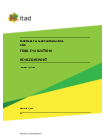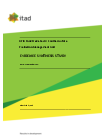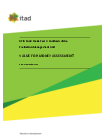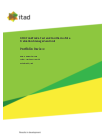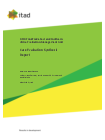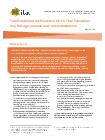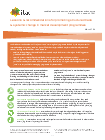Evaluation learning products East and Southern Africa Staple Food Markets Programme
Emerging Insights from DFID funded food markets programme in East and Southern Africa.
The East and Southern Africa Staple Food Markets (2013 to 2018) was a trade enhancement and promotion programme funded by the DFID UK £35m aimed at improving functioning of national and regional staple food market systems. The programme operations and grant coverage largely took place in 5 countries (Kenya, Rwanda, Tanzania, Uganda and Zambia) and focused on staple food crops: maize, rice and beans (including soya).
The programme used 3 instruments:
-
a Challenge fund, to stimulate innovative private sector investment
-
a Development fund, which aimed to unblock systemic constraints within staples supply chains
-
an independent evaluation, focusing on accountability (programme results) and lesson learning
The objectives of the evaluation was to generate information on the performance of the overall programme and accountability for funds spent, assessing whether the programme brought about the change expected, as well as lessons learned, exploring how and why some interventions were successful and others not, to feed in lessons to the next programme and similar programmes, including recommendations on how to improve performance in future.
The evaluation follows a theory-based approach, exploring what change materialised (or may materialise in the future), the extent of that change and FTESA’s contribution, and how and why, for whom and in what circumstances, and whether any changes will endure after programme closure (sustainability). It provides evidence (where available) of ‘proof of concept’, i.e. whether the underlying theories behind such programmes hold true.
The final evaluation considers the change processes identified in the Theory of Change, as well as the more detailed theories, and the extent to which interventions have affected these change processes or may do so in future. This report combines, compares and contrasts the evidence from the different evaluation modules against the expected results, Evaluation Questions (EQs) and underlying theories. The report identifies and explores emerging patterns and themes to produce findings, conclusions, lessons and recommendations against 8 EQs.
This synthesis study was commissioned by DFID to inform the design of the new FoodTrade and Resilience Programme. It provides lessons on what works (‘emerging evidence’) drawing on evidence from the FoodTrade East & Southern Africa (FTESA) and West Africa Food Markets (WAFM) programmes, other similar programmes and wider secondary literature.
The focus for the synthesis is on:
- emerging evidence of benefits to smallholder farmers’ participating in more structured trade
- emerging evidence of the benefits to local businesses (aggregation and primary processing) of trading regionally
- emerging evidence of the success of business-led advocacy (supported by political economy [PEA] analysis)
- any emerging evidence from increased availability of quality seeds due to regional variety catalogue
- emerging evidence of Value for Money (VfM) of different project components and approaches/ interventions
This report provides an assessment of the Value for Money (VfM) of FoodTrade East and Southern Africa (FTESA). The report includes an internal benchmarking of FTESA grants, as well as an external benchmarking of FTESA to similar programmes elsewhere. The VfM assessment used data to explore VfM of the overall FTESA portfolio at the grant level, as well as by sub-groups of grants and the funding mechanism (challenge and development fund). The assessment also compares FTESA VfM with other similar programmes (e.g. WAFM and other similar DFID-funded market development programmes). Whilst recognising the differences, there are enough similarities in approaches across these programmes to enable comparison.
The Portfolio Review explores FTESA grants/interventions to provide a broad coverage and assessment of the grant portfolio and performance against the evaluation questions. It attempts to answer all evaluation questions for the final evaluation drawing exclusively on secondary evidence. It is a key input to the Final Evaluation Report along with other modules.
The total portfolio included 6 Development Fund grants and 14 Challenge Fund grants. The Review drew on secondary information, including monitoring data and reports prepared by the Programme Management Unit and grantees. The review included assessment of the quality of evidence, scoring grantee reports for completeness and level of detail, readability and quality of analysis.
The report presents the synthesis of the endline qualitative case studies and quantitative surveys and forms a major part of the overall final evaluation of Food Trade East and Southern Africa (FTESA). Six qualitative case studies and 2 quantitative surveys feed into the synthesis. The fieldwork for both the case studies and the surveys focused at the farmer level.
The case studies and quantitative surveys cover grants to the following organisations:
- Eastern Africa Grain Council (EAGC)
- Joseph Initiative
- Kaderes Peasant Development
- Kilimo Trust
- Mount Meru Millers and Virtual City
The synthesis identifies and explores emerging patterns and themes to produce: findings, conclusions, lessons learned and recommendations against the EQs and sub-EQs.
and
The 2 briefs provide an overview of the FoodTrade East and Southern Africa (FTESA) programme and summarises the final evaluation’s findings, lessons and recommendations. They also provide lessons and recommendations on how market development programmes can promote structured trade and systemic change, drawing on the findings of the final evaluation
